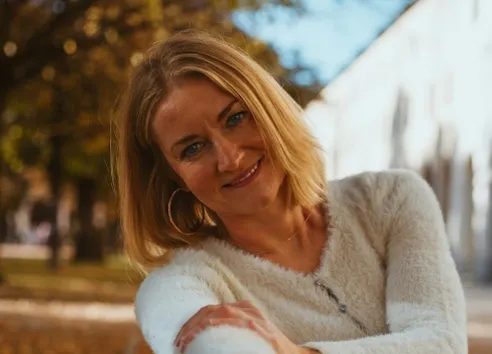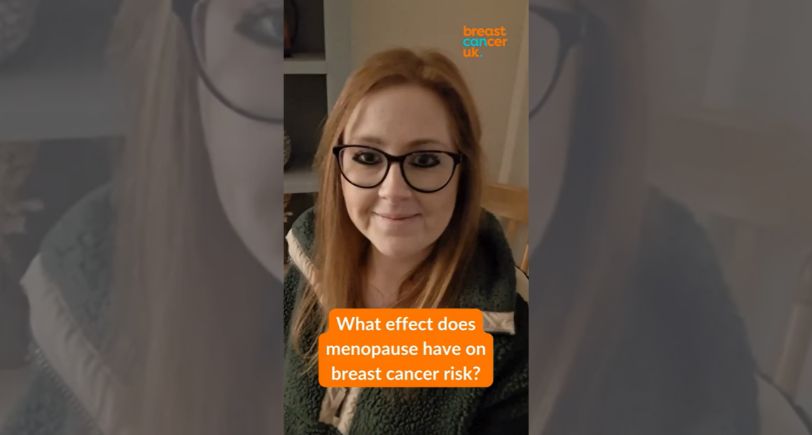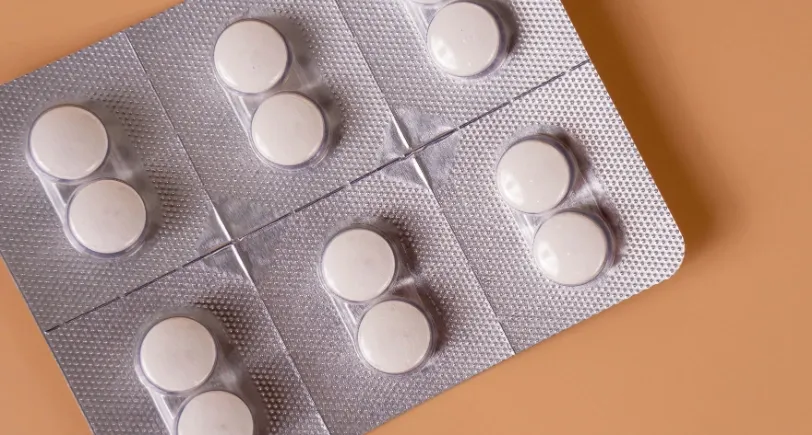Menopause and breast cancer.
What is the link?

How does menopause affect my breast cancer risk?
Menopause does not cause breast cancer. Yet, your risk of developing breast cancer increases with age. It is most common in people over the age of 50 who have been through menopause (8 out of 10 cases) compared to other age brackets. As you age, mutations can potentially build up in your cells, including those that may increase your risk of breast cancer.
Also, post-menopause, oestrogen is mainly produced by fat tissue, which makes up a bigger proportion of your breasts. This means the levels of oestrogen in your breast can be higher, which may increase your risk of breast cancer.
Tips to reduce your risk at menopause.
Maintain a healthy weight.
Focus on achieving and maintaining a healthy body weight for your height.
Drink less alcohol and nourish your body.
Aim to have some alcohol-free days each week. Swap alcoholic drinks for non-alcoholic drinks. Follow a healthy and balanced diet, high in fruit and vegetables, lean proteins and wholegrains.
Make activity routine.
Build activity into your daily routine. Mix it up to keep consistency.
Key facts about menopause and breast cancer risk.
-
Menopause is a natural part of ageing when you stop having monthly periods, usually between the ages of 45 and 55.
-
If you are over the age of 50 and have been through menopause, you have a higher risk of breast cancer.
-
After menopause, things that increase your risk of breast cancer include reaching menopause after the age of 55, being overweight or obese, having type 2 diabetes, and taking hormone replacement therapy (HRT).
-
HRT is used to manage the symptoms of menopause and has been associated with an increased risk of developing breast cancer. Your risk varies according to the type of HRT and duration of use.
What factors increase my breast cancer risk after menopause?
If you reach menopause after the age of 55, you have a higher risk of breast cancer. Your risk is higher if you also started your periods before the age of 12. This may be due to a more prolonged exposure to oestrogen circulating in your body.
Having higher levels of naturally circulating sex hormones (oestrogen, progesterone and testosterone) increases your breast cancer risk. Post-menopausal individuals with higher levels of naturally circulating oestrogen have around twice the risk of breast cancer compared to those with lower levels.
Being overweight or obese after reaching menopause is a significant risk factor for breast cancer, and your risk increases the more weight you gain. A UK study found that post-menopausal women who were obese had a 30% higher risk of breast cancer compared to those of a healthy weight.
Type 2 diabetes increases your risk of breast cancer, particularly post-menopause. However, the reason behind this is not completely understood.

Ask the scientist: What effect does menopause have on breast cancer risk?
What is menopause?
Menopause is a part of ageing when your periods stop without medication or pregnancy. This usually happens between the ages of 45 and 55. Menopause can also occur due to certain surgeries, such as the removal of your ovaries. Cancer treatments, such as chemotherapy and radiotherapy, may also affect menopause. Some transgender men and non-binary individuals, born female, can also experience menopause.
The menopausal phase can be broken down into three parts: peri-menopause, menopause and post-menopause. The time from the start of your menopausal symptoms (such as less frequent or irregular periods) until your last period is known as peri-menopause and can last several years.
Menopause is a singular event marked by your last period. Menopause is medically confirmed when you haven’t had a period for 12 months (see diagram below). The time after menopause is commonly known as post-menopause.
Diagram of the peri-menopause, menopause, and post-menopause.
What are the main changes during menopause?
Your body undergoes multiple changes during the time associated with menopause. These are mainly ovarian and hormonal.
Your sex hormone levels decrease, changing the typical pattern of your menstrual periods, which eventually stop altogether as the ovaries no longer release eggs.
Other common symptoms of menopause include hot flushes, brain fog and memory issues, sleep disturbances, body shape changes, reduced breast density, weight gain, bone density loss and vaginal dryness.
Does HRT cause breast cancer?
Hormone replacement therapy (HRT) has been associated with an increased risk of breast cancer. However, your risk depends on the type of HRT you take and the duration of use.
HRT is used to manage the symptoms of menopause by replacing either the sex hormones oestrogen and progesterone or just oestrogen. With oestrogen-only HRT, there is little to no increased risk of breast cancer. This type of HRT is usually only recommended to people who have had their uterus removed (hysterectomy).
Combined HRT, which consists of taking a combination of both oestrogen and progestogen, may increase your breast cancer risk when used over five years. Your risk reduces after you stop taking the combined HRT treatment. But some risk remains if used for over ten years.
The decision to take HRT is your individual choice, made in consultation with your qualified healthcare professional based on personal symptoms.
Start your prevention journey today.
Choose one change you can make today to reduce your risk during menopause and post-menopause:
- Prioritise physical activity. Make time for a walk, a bike ride, or a workout. Regular exercise helps maintain a healthy weight, which is a key factor in reducing breast cancer risk.
- Consider reducing the amount of alcohol you drink, or stop entirely. Even small amounts of alcohol can increase risk.
- Focus on a diet rich in fruits, vegetables, and whole grains, and limit processed foods and red meat. A healthy diet contributes to a healthy weight and overall wellness, which can help lower breast cancer risk.
Remember, these small steps can make a big difference. Which one will you try first?
Further reading
For more information, read our HRT, Menopause and Breast Cancer science review.
Breast Cancer UK aims to use inclusive language where possible. However, when the data is taken from a gender-specific subset, for example, women, we respect the gender-specific categorisation used in the data set.
Last review: Feb-24 | Next review: Feb-27.
-
- NHS Inform. Menopause 2022. https://www.nhsinform.scot/healthy-living/womens-health/later-years-around-50-years-and-over/menopause-and-post-menopause-health/menopause/ (accessed October 25, 2023).
- Grant MD, Marbella A, Wang AT, Pines E, Hoag J, Bonnell C, et al. Menopausal Symptoms: Comparative Effectiveness of Therapies 2015;147. https://www.ncbi.nlm.nih.gov/books/NBK285463/ (accessed September 28, 2023).
- Harper JC, Phillips S, Biswakarma R, Yasmin E, Saridogan E, Radhakrishnan S, et al. An online survey of perimenopausal women to determine their attitudes and knowledge of the menopause. Women’s Health 2022;18. https://doi.org/10.1177/17455057221106890 (accessed December 13, 2023).
- Jesinger RA. Breast Anatomy for the Interventionalist. Tech Vasc Interv Radiol 2014;17:3–9. https://doi.org/10.1053/j.tvir.2013.12.002 (accessed December 13, 2023).
- NHS. Breast cancer in women – Causes. https://www.nhs.uk/conditions/breast-cancer/causes/ (accessed November 17, 2023).
- Brown SB, Hankinson SE. Endogenous estrogens and the risk of breast, endometrial, and ovarian cancers. Steroids, 2015;99(Pt A):8–10. https://doi.org/10.1016/j.steroids.2014.12.013 (accessed December 13, 2023).
- García-Estévez L, Cortés J, Pérez S, Calvo I, Gallegos I, Moreno-Bueno G. Obesity and Breast Cancer: A Paradoxical and Controversial Relationship Influenced by Menopausal Status. Frontiers in Oncology, 2021;11. https://doi.org/10.3389/fonc.2021.705911 (accessed December 13, 2023).


